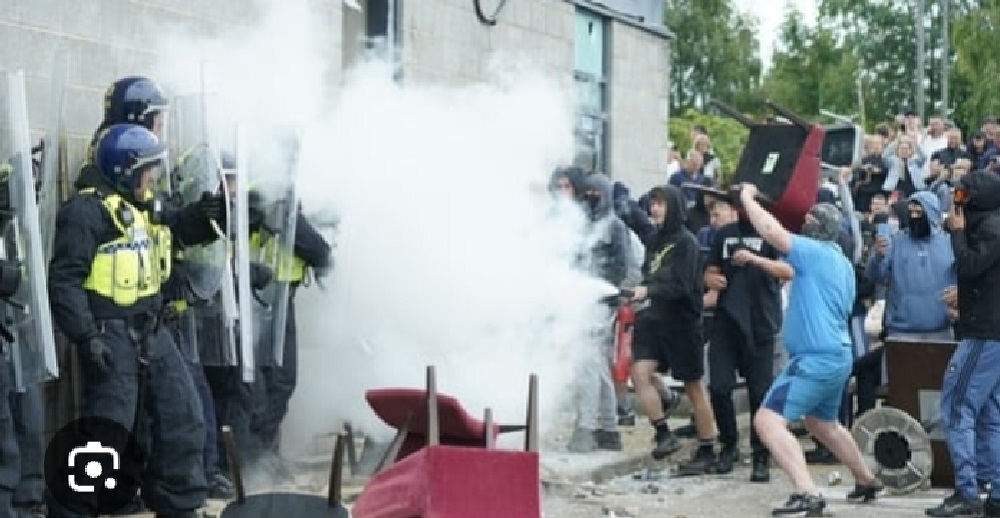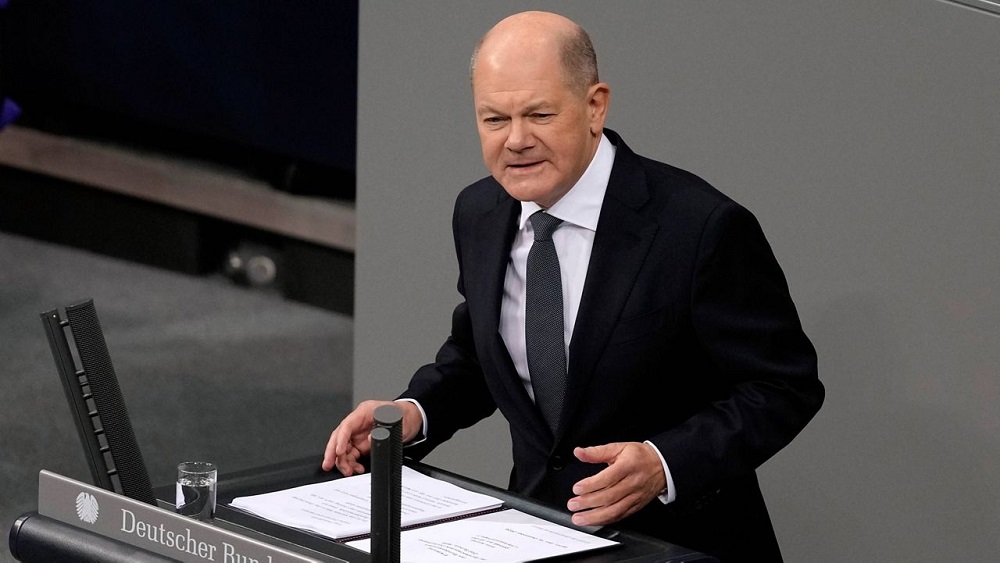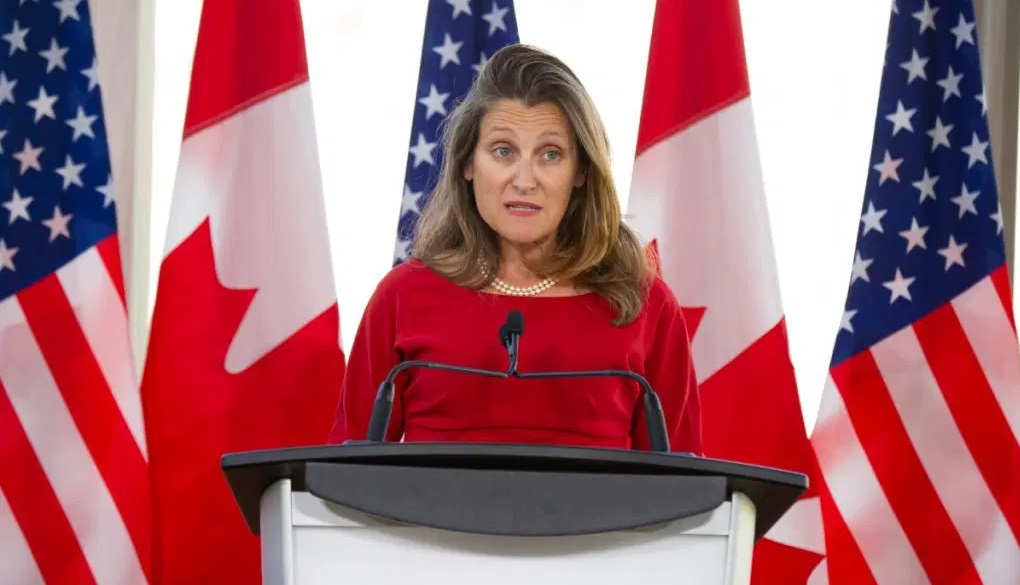Foreign
UK Rioters Threw Bottles At Police, Injuring Several Officers, Loot Shops

Rioters threw bricks, bottles and flares at police — injuring several officers — looted and burnt shops, while demonstrators shouted anti-Islamic slurs as they clashed with counter-protesters.
The anti-immigration protesters smashed a window at a migrant hotel in Rotherham and started a fire just outside, after clashing with police at a rally.
Shortly after 2pm, on Sunday, some of the protesters were seen to have smashed a window of the hotel, with people appearing to climb inside.
Later, people were filmed setting fire to a bin just outside the smashed window. Police later seemed to have pushed back the rioters, but the fire continued to rage for some time.
Others simply stood around and watched, or filmed the scenes for social media. Chants in support of Tommy Robinson, the far-right activist, were heard.
Some balaclava-clad demonstrators were earlier seen hurling objects at police at the Holiday Inn in the south Yorkshire city. At least one officer was carried away injured.
UK leader Keir Starmer warned far-right protesters on Sunday they would “regret” participating in England’s worst rioting in 13 years, as disturbances linked to the murder of three children earlier this week flared across the country for a fifth day.
Unrest related to misinformation about the mass stabbing last Monday in the northwestern English seaside town of Southport has impacted multiple towns and cities, with anti-immigration demonstrators clashing with police.
The violence is posing an early major challenge for Starmer, who was elected only a month ago after leading Labour to a landslide win over the Conservatives.
“I guarantee you will regret taking part in this disorder. Whether directly or those whipping up this action online, and then running away themselves,” Starmer said in a TV address.
He added that there was “no justification” for what he called “far-right thuggery” and promised to bring the perpetrators “to justice”.
Footage aired on the BBC showed rioters forcing their way into a Holiday Inn Express in Rotherham. They also pushed a burning bin into the building. It was not clear whether asylum seekers were inside.
In the northeastern English city of Middlesbrough, hundreds of protesters squared up to riot police carrying shields. Some threw bricks, cans and pots at officers.
The fresh disturbances came after more than 90 people were arrested on Saturday following skirmishes at far-right rallies in Liverpool, Manchester, Bristol, Blackpool and Hull, as well as Belfast in Northern Ireland.
The violence is the worst England has seen since the summer of 2011, when widespread rioting took place following the police killing of a mixed-race man in north London.
“We’re now seeing it (trouble) flooding across major cities and towns,” said Tiffany Lynch of the Police Federation of England and Wales.
Riots first flared in Southport on Tuesday night following Monday’s frenzied knife attack at a Taylor Swift-themed dance party in the northwest coastal city, before spreading up and down England.
They were fuelled by false rumours on social media about the background of British-born 17-year-old suspect Axel Rudakubana, who is accused of killing a six, seven, and nine-year-old, and injuring another 10 people.
Police have blamed the violence on supporters and associated organisations of the English Defence League, an anti-Islam organisation founded 15 years ago whose supporters have been linked to football hooliganism.
Agitators have targeted at least two mosques, and the UK interior ministry announced Sunday it was offering new emergency security to the Islamic places of worship.
The rallies have been advertised on far-right social media channels under the banner “Enough is enough”.
Participants have waved English and British flags while chanting slogans like “Stop the boats” — a reference to irregular migrants travelling to Britain from France.
Anti-fascist demonstrators have held counter-rallies in many cities, including Leeds where they shouted, “Nazi scum off our streets”, as the far-right protesters chanted, “You’re not English any more”.
Not all the gatherings have turned violent. A peaceful one in Aldershot, southern England, on Sunday saw participants hold placards that read “Stop the invasion” and “We’re not far right, we’re just right”.
Economy
UK inflation rises further ahead of Bank of England rates decision

UK inflation climbed to 2.6% in November, up from 2.3% in October, according to the Office for National Statistics (ONS).
The rise matches market expectations and comes as the Bank of England prepares for its upcoming decision on interest rates later this week.
Core inflation, which excludes volatile items such as food and energy, also increased to 3.5% from 3.3% in October. However, this was slightly below the anticipated figure of 3.6%. Services inflation, closely watched by the Bank of England for signs of domestic price pressures, remained steady at 5%, slightly below market expectations of 5.1%.
Earlier this year, falling inflation allowed the Bank of England’s Monetary Policy Committee (MPC) to lower interest rates in August and November. The headline rate dropped to 1.7% in September but has since been pushed higher by rising energy costs and persistent services inflation.
Despite the recent uptick, the Bank of England is widely expected to keep interest rates on hold at its meeting this week. Markets remain divided on whether a rate cut will come at the February meeting.
Michael Brown, senior research strategist at Pepperstone, highlighted the challenges ahead. “While risks to this base case are tilted towards a more dovish outcome, given increasing signs of overall economic momentum stalling, policymakers will be rapidly seeking convincing signs of disinflationary progress being made, as the economic cocktail facing UK Plc. increasingly becomes a stagflationary one,” he said.
The inflation figures follow Tuesday’s data showing stronger-than-expected wage growth. Average earnings, including bonuses, rose by 5.2%, exceeding the 4.6% forecast and October’s figure of 4.4%.
Chancellor to the Exchequer Rachel Reeves acknowledged the ongoing struggles faced by households. “I know families are still struggling with the cost of living and today’s figures are a reminder that for too long the economy has not worked for working people,” she said.
Reeves outlined recent measures aimed at supporting workers, including no increases to national insurance, income tax, or VAT, as well as boosting the national living wage by £1,400 and freezing fuel duty. “Since we arrived, real wages have grown at their fastest in three years. That’s an extra £20 a week after inflation. But I know there is more to do. I want working people to be better off, which is what our Plan for Change will deliver,” she added.
Inflation is expected to rise further in the coming year as the UK continues to take a more gradual approach to easing monetary policy compared to other developed central banks.
Foreign
Germany’s Scholz loses a confidence vote, setting up an early election in February

Chancellor Olaf Scholz lost a confidence vote in the German parliament on Monday, putting the European Union’s most populous member and biggest economy on course to hold an early election in February.
Scholz won the support of 207 lawmakers in the 733-seat lower house, or Bundestag, while 394 voted against him and 116 abstained. That left him far short of the majority of 367 needed to win.
Scholz leads a minority government after his unpopular and notoriously rancorous three-party coalition collapsed on Nov. 6 when he fired his finance minister in a dispute over how to revitalize Germany’s stagnant economy. Leaders of several major parties then agreed that a parliamentary election should be held on Feb. 23, seven months earlier than originally planned.
The confidence vote was needed because post-World War II Germany’s constitution doesn’t allow the Bundestag to dissolve itself. Now President Frank-Walter Steinmeier has to decide whether to dissolve parliament and call an election.
Steinmeier has 21 days to make that decision — and, because of the planned timing of the election, is expected to do so after Christmas. Once parliament is dissolved, the election must be held within 60 days.
In practice, the campaign is already well underway, and Monday’s three-hour debate reflected that.
What did the contenders say?
Scholz, a center-left Social Democrat, told lawmakers that the election will determine whether “we, as a strong country, dare to invest strongly in our future; do we have confidence in ourselves and our country, or do we put our future on the line? Do we risk our cohesion and our prosperity by delaying long-overdue investments?”
Scholz’s pitch to voters includes pledges to “modernize” Germany’s strict self-imposed rules on running up debt, to increase the national minimum wage and to reduce value-added tax on food.
Center-right challenger Friedrich Merz responded that “you’re leaving the country in one of its biggest economic crises in postwar history.”
“You’re standing here and saying, business as usual, let’s run up debt at the expense of the younger generation, let’s spend money and … the word ‘competitiveness’ of the German economy didn’t come up once in the speech you gave today,” Merz said.
The chancellor said Germany is Ukraine’s biggest military supplier in Europe and he wants to keep that up, but underlined his insistence that he won’t supply long-range Taurus cruise missiles, over concerns of escalating the war with Russia, or send German troops into the conflict. “We will do nothing that jeopardizes our own security,” he said.
Merz, who has been open to sending the long-range missiles, said that “we don’t need any lectures on war and peace” from Scholz’s party. He said, however, that the political rivals in Berlin are united in an “absolute will to do everything so that this war in Ukraine ends as quickly as possible.”
What are their chances?
Polls show Scholz’s party trailing well behind Merz’s main opposition Union bloc, which is in the lead. Vice Chancellor Robert Habeck of the environmentalist Greens, the remaining partner in Scholz’s government, is also bidding for the top job — though his party is further back.
The far-right Alternative for Germany, which is polling strongly, has nominated Alice Weidel as its candidate for chancellor but has no chance of taking the job because other parties refuse to work with it.
Germany’s electoral system traditionally produces coalitions, and polls show no party anywhere near an absolute majority on its own. The election is expected to be followed by weeks of negotiations to form a new government.
Confidence votes are rare in Germany, a country of 83 million people that prizes stability. This was only the sixth time in its postwar history that a chancellor had called one.
The last was in 2005, when then-Chancellor Gerhard Schröder engineered an early election that was narrowly won by center-right challenger Angela Merkel.
Foreign
Canada deputy PM quits amid tariff rift with Trudeau

Canada Deputy Prime Minister Chrystia Freeland quit Monday in a surprise move after disagreeing with Justin Trudeau over US President-elect Donald Trump’s tariff threats.
Freeland also stepped down as finance minister, and her resignation marked the first open dissent against Prime Minister Trudeau from within his cabinet and may threaten his hold on power.
Liberal Party leader Trudeau lags 20 points in polls behind his main rival, Conservative Pierre Poilievre, who has tried three times since September to topple the government and force a snap election.
“Our country today faces a grave challenge,” Freeland said in her resignation letter, pointing to Trump’s planned 25 percent tariffs on Canadian imports.
“For the past number of weeks, you and I have found ourselves at odds about the best path forward for Canada.”
First elected to parliament in 2013, the former journalist joined Trudeau’s cabinet two years later when the Liberals swept to power, holding key posts including trade and foreign minister, and leading free trade negotiations with the EU and the United States.
Most recently, she had been tasked with helping lead Canada’s response to moves by the incoming Trump administration.
Canada’s main trading partner is the United States, with 75 percent of its exports each year going to its southern neighbor.
In her resignation letter, Freeland said Trudeau wanted to shuffle her to another job, to which she replied: “I have concluded that the only honest and viable path is for me to resign from the cabinet.”
As finance minister, she explained the need to take Trump’s tariffs threats “extremely seriously.”
Warning that it could lead to a “tariff war” with the United States, she said Ottawa must keep its “fiscal powder dry.”
“That means eschewing costly political gimmicks, which we can ill afford,” she said in an apparent rebuke of a recent sales tax holiday that critics said was costly and aimed at bolstering the ruling Liberals’ sagging political fortunes.
Trouble for Canada Trudeau
Dalhousie University professor Lori Turnbull called Freeland’s exit “a total disaster.”
“It really shows that there is a crisis of confidence in Trudeau,” she said. “And makes it much harder for Trudeau to continue as prime minister.”
Until now, the cabinet has rallied around Trudeau as he faced pockets of dissent from backbench MPs, noted Genevieve Tellier, a professor at the University of Ottawa.
Freeland’s rejection of his economic policies poses “a big problem,” she said, and shows his team is not as united behind him as some thought.
Freeland’s departure comes on the same day she was scheduled to provide an update on the nation’s finances, amid reports the government would blow past Freeland’s deficit projections in the spring.
“This government is in shambles,” reacted Poilievre’s deputy leader, Andrew Scheer, to Freeland’s news, saying “Even she has lost confidence in Trudeau.”
Housing Minister Sean Fraser, who also announced Monday he was quitting politics, described Freeland as “professional and supportive.”
One of her closest friends and allies in cabinet, Anita Anand, told reporters: “This news has hit me really hard.”
Freeland said she would run in the next election, expected in 2025.
-

 News21 hours ago
News21 hours agoGov Adeleke Speaks On Death Sentence For Chicken Thief
-

 News17 hours ago
News17 hours agoNetizens Slam Lawmakers As They Sing Tinubu’s Anthem At Budget Presentation
-

 News14 hours ago
News14 hours agoFinally, PDP Flushes Out Suspended National Vice Chairman, Ali Odefa
-

 News21 hours ago
News21 hours agoDelta Assembly pardons two suspended members
-

 News21 hours ago
News21 hours agoJust in: CBN Imposes N100k Bar on PoS, Issues Warning to Operators
-

 News10 hours ago
News10 hours agoReps Call for Revival of NAPAC to Boost Transparency, Accountability
-

 News21 hours ago
News21 hours agoHeavy Security Presence at National Assembly as President Tinubu Presents 2025 Budget
-

 News10 hours ago
News10 hours agoReps Recommends Delisting NECO, UI, Labour Ministry, 21 Others From 2025 Budget








